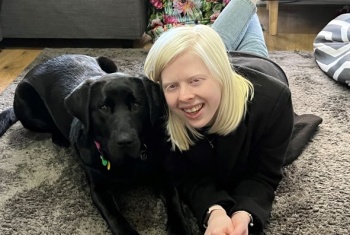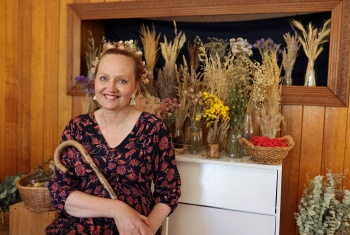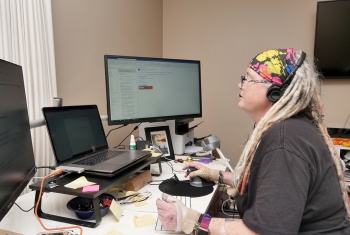Thornbury NDIS participant Kira Young said her NDIS funding has changed her life, providing more opportunities to access supports and equipment than ever before, while also supporting her to attain her teaching degree.
Kira, 25, who has juvenile idiopathic arthritis, along with glaucoma and uveitis causing low vision, said when she was younger, her parents tried to provide what they could but additional supports or equipment were costly.
Now an NDIS participant, Kira can access all the supports and equipment she needs through a range of disability organisations like Guide Dogs Victoria and Vision Australia, who can help her build and maintain her independence.
“These organisations have been great. Most people think Guide Dogs Victoria only fund guide dogs, but they do lots of other stuff and I’ve been doing cane training with them,” Kira said.
“I’ve been taught how to use a cane properly, so I can feel more confident crossing roads, navigating gutters, dips in the ground, accessing buildings, going up and down stairs and best of all, travelling on public transport.
“As a young person, it’s awesome I can now access all these supports because independence is key - I can’t drive so to be able to catch public transport and get to where I need to be is great, especially when I’m travelling back and forth to university and work.”
In her fourth year of a teaching degree, Kira said she also gets NDIS funding to employ a support worker who can attend lectures with her, which really worked well during COVID.
“I found working online a bit overwhelming. It was hard to keep up with audio delays and everyone talking over each other, and with three-hour lectures I’d get eye fatigue. It was a difficult environment, so having a support worker there for support has been huge,” she said.
“Most of my teaching material is quite visual so my support worker, who is on the Zoom lecture too, can help me take notes and quickly find what I need on the screen.
“She sends me a quick message to say on the screen now is a picture with lots of colours and squares and it describes the eight principles of teaching. It’s been great having that extra pair of eyes when I’m dealing with a constant!”
Living independently, Kira also receives NDIS funding for a cleaner and a gardener to help her maintain her home.
“I can’t really mop floors because I can’t tell if they’re clean or not. I can, but it wouldn’t be a good job!” she joked. “But it’s great to have that support to know it’s been done right.”
Kira said prior to the NDIS, she found it challenging to get supports.
“With my disability I’ve always been in that grey area. I’m kind of on the borderline sometimes, then on the line and then I can tap dance over it. It made getting any supports for my disability complicated,” she said.
“My parents tried very hard to make sure I had what I needed, but it wasn’t always something we could budget for, so knowing I’ve got my NDIS funding sitting there and I don’t have to worry about paying for supports and equipment myself, is a huge relief.”
Kira’s advice to other people with disability is to not be complacent: “Reach out and get advice and research several types of supports and equipment,” she said.
“When it came to my low vision, I often felt I was taking up space from people with less vision, but I think if anything, we are all as worthy as each other so reaching out to the NDIS and organisations like Guide Dogs Victoria and Vision Australia is really important to ensure you get the support you need,” she said.



